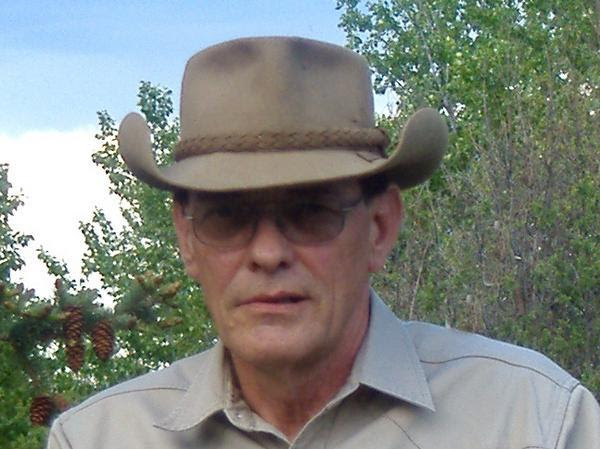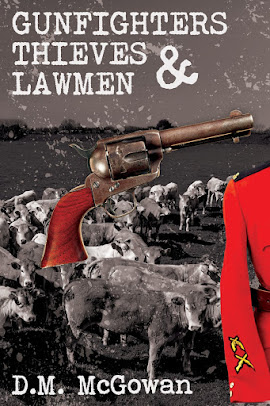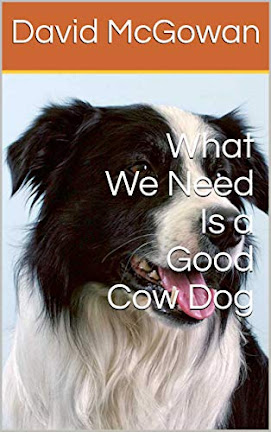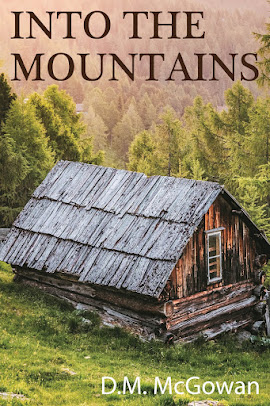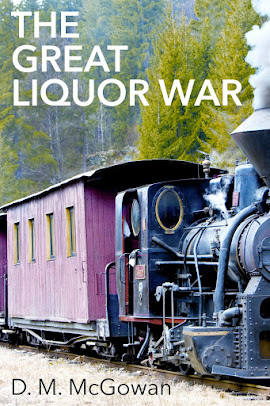Forward
For many
years I have been writing and telling stories about people I’ve known, places
I’ve been, experiences I’ve had and the country I have spent time in or passed
through. I have found that my experience with people, places and events
sometimes clashes violently with those scenes depicted in Canadian history
books. As a result I enjoy taking historical events and weaving them into my
own stories.
My first
attempt at publishing, “The Great Liquor War” was done in the “traditional”
manner with the printing of 600 copies in 1998. A fine thing to start I
thought, but within three months all copies were gone.
Since then
“Partners” was released in 2008 and “Homesteader: Finding Sharon” in 2009.
“Homesteader”
is a sequel to “The Great Liquor War”
This
release of “Liquor War” is in Print on Demand which should keep copies
available for a long time to come. There have been a few slight changes in the
manuscript for this release but it still remains loyal to the original.
My usual
notes on the history that might pertain to this story can be found at the end
but in addition you will find excerpts from some upcoming releases. You can
also find, on those occasions when I get enough breathing space to post,
excerpts and short stories on my blog at
www.dmmcgowan.blogspot.com You can also make comments and email from
there.
There are
also connections on this site to my author web page
1
I
rode beside a carriage built to carry no more than six people but holding
eight. We only intended to go as far as the Farwell train station, so the
rested team would easily handle the load, despite their light weight. Some of
the men might have been able to run to the station almost as fast as they were
being carried, but the sight of policemen running down the street would have
created much more unwanted attention than the overloaded carriage. Besides, at
that point they were all desperate to maintain a dignified appearance.
The
crowded conditions also forced them into a unity that they would soon need to
survive and had not practiced recently. True, they were all peace officers with
similar views of the world that develop with folks who have their occupation in
common. However, three of them were British Columbia Policemen and the others
wore the dress uniform of the North West Mounted Police. Their respective superiors
had recently managed to force these men into a situation where they had been
pointing their pistols at each other.
Even
though I rode with them, I was not a policeman, had no intention of being one,
and wasn’t looking forward to the meeting we were about to have. We were riding
toward a situation where we might all be shot, and I wasn’t at all happy about
being put in that kind of danger. I hadn’t actually volunteered to go along, it
wasn’t my job to face down thieves, and yet I wasn’t really being forced to
join them. I was with them because one of the B.C. Constables, Jack Kirkup, had
done me a favor a year and a half before. True, that favor had resulted in my
enjoying success, but I didn’t think I needed to be shot and killed to pay for
it.
Almost
everyone can remember at least one person or event that changed the course of
their life. Sometimes these people and events come together causing far more
than a simple upset. There have been more twists and turns in my life than you’d
find in a mountain stream, but the first important one that I remember was the
combination of Jack Kirkup and what I think of as the Great Liquor War.
It
was a fellow by the name of Jerry Hill who had the booze that started it all,
but he had almost nothing to do with the war. It was the North West Mounted
Police and the British Columbia Police that fought over it. And it was guys
like Jerry Hill and I that had our lives torn apart because of it. Of course,
my own involvement would have been far less if it hadn’t been for the debt I
believed I owed Jack Kirkup.
It
was a year before the Liquor War that I met Jack in Rossland. I came up to the
country the fall before with the idea of making my fortune by panning for gold.
Actually,
that’s not exactly true. I returned to the brand new country of Canada that year. I was born some place north of Fort York in Upper Canada one month before Daddy moved to Kansas. He
wanted to move to Oregon but he ran out of steam in Kansas and
we stayed there until the drought ran us out in ‘83.
I
always found that part of my family history real interesting. We moved to Kansas right
after the Civil War and right into the middle of bad feelings between those who
supported the Union and those for the South. We lasted through raids by outlaws
from both sides - with relatives in both groups - and protected our home from
Indian raids. We handled everything that man could throw at us, but we couldn’t
beat Mother Nature. And after the sun dried the land and finished our crops, we
finished the move to Oregon that had been interrupted eighteen years before.
When
we got to the end of that trail, I tried to talk Paw into trying something new.
He had always had trouble feeding his family from farming, and it sure wasn’t
from lack of trying. He just wasn’t a great farmer. The land he chose in Kansas was
too dry to grow crops and it looked like what he picked in Oregon was
too wet.
“You’re
a fool, boy,” he said. “All I ever done is farm. I don’t know nothin’ ‘bout loggin’ r’ fishin’. Family’d starve, I went t’ doin’ somethin’ else.”
I
looked around at my brothers, my sister, and at my mother. I was sure Paw had
used up the little cash money he had managed to put in his pocket before we
left Kansas. I knew there wasn’t much to put into the cupboards that hadn’t
been built yet. I decided that my mouth was just another one to be fed from a
farm that couldn’t feed those that needed it. I lit out on my own.
A
year later - the spring of ‘84 - I was on my own gold claim near Rossland, British Columbia. It was about then that I realized all the good gold claims
were gone and I wasn’t doing much more than making a living on mine. I was
trying to decide if I should keep it up, look for a new claim, or look for a
new way to make my fortune. While I was doing all this thinking I was shoveling
gravel into my rocker and washing it down for the gold.
Not
that I wasn’t seeing lots of color. Every time I worked that rocker I’d find at
least some gold in it. I was making a living on that claim, and there were lots
of folks that didn’t do that. But there was no way I was gonna get rich on that
piece of ground, and I knew it.
I
think it might have been the country that got to me. Not that it ain’t pretty,
for it surely is. But it was a might on the dry side, at least that year, and
tended to remind me of Kansas during the drought.
Mind,
the land kind of rolls in Kansas, but it doesn’t have those pretty hills and mountains. I guess
it was just the dryness that made me think of the hard times that drove us out
of a nice place that I still think of as home, even after all these years.
While
I was rolling all manner of things through my mind, and washing dirt from the
dirt, a fellow rode down the creek and told me there was gonna be a big prize
fight in town. It had been several months since I’d had any entertainment and
weeks since I’d been off the claim. Watching a fight seemed like a good idea,
and I figured I could make my decision just as well from ringside as I could
from creek side.
When
I got into town I found a good place to camp on the edge of town, up on a ledge
covered with aspen and surrounded by spruce. I stripped the pack and saddles
from my horses, picketed them, and set about to cook some supper.
About
the time I started the fire another fellow with just a riding horse came into
the grove, dismounted and began to make camp. In those days it was a good idea
to be careful who you invited into your camp, for not only did others judge you
by the company you kept, but sometimes the company you kept wasn’t against
taking things without asking: maybe your life. I kept an eye on him for a bit,
decided he wasn’t a danger I couldn’t handle, and called him over.
“Might
as well join the fire,” I called out. “No sense two of us heatin’ up the
night.”
He
waved at me and a few minutes later came over with his plate, cup, and a slab
of bacon. He was a well set up man just a little older than me, wearing laced
miner’s boots that were in pretty good shape. His pants were made of canvas, a
lot like what we call jeans now only they hadn’t been dyed blue, and his jacket
looked like it had been made for him as part of a suit, although it was startin’
to show some wear. Like me he wore a bushy moustache that hung down both sides
of his mouth, but unlike me, his side burns were also bushy and extended down
to the corner of his jaw.
Now
his hat was of special note. It was one of them round, hard things with a
reverse curl brim. I think they call them a derby. There were places them days
where a hat like that would get you in a fight.
Not
that folks didn’t wear derby hats back then. There were all kinds of head gear
in the country, but most had been beaten and smashed about and generally made
into part of the landscape. Most of the underground miners would take a beat up
hat, maybe a derby, and shellac it until it was almost as hard as the rocks
that might fall on their even harder heads. I always wore a Stetson and the one
I was wearing then had held water for my horses more than once. His headgear
looked like it had been brushed regular and was the property of some city
swell. The point is, he was pretty well fixed up in comparison to the way most
folks had to dress at the place and time.
Take
my own rig for example. On my feet was a pair of moccasins, one of several pair
I had made from the hide of the elk whose meat had been keeping me alive
through the winter. I had two pair of bib-coveralls, and the ones I wore only
had one small patch on the seat, and one seam stitched up at the hip, so they
were my good ones. The blue flannel shirt I wore had been new six months
before, so it wasn’t faded too bad, but it was the only one I owned. I had a
good sheep skin vest, but the hide on the outside hadn’t been white for a long
time, and the coat in my pack had been made from the hide of a bear who had out
worn it before me. I had one pair of long johns, which had been washed before I
headed for town, and I already mentioned my hat.
There
were many men carrying pistols in those days, usually in a pocket, or behind
the waist band of their pants and hooked in a suspender, but I wore a gun belt.
I took it from the body of a man my Maw shot on the trail from Kansas.
While Paw and I were rounding up the stock one morning, this gentleman decided
that Maw and my sister would be easy pickings. He was wrong. It was a nice,
wide belt, with an Army Colt in the holster, and, on the other side, a 15 inch
Bowie knife. Later I had made a sheath to hang next to it and hold a 4 inch
skinning knife.
After
he set his things down by the fire, he straightened and stuck out his hand.
“Jerry
Hill,” he said. “Pleased to have somebody else cook, for a change.”
Now
I hadn’t said anything about cooking, just that I’d share the fire, but I didn’t
object, considering that he offered the first smoked side meat I’d seen in a
couple of months.











